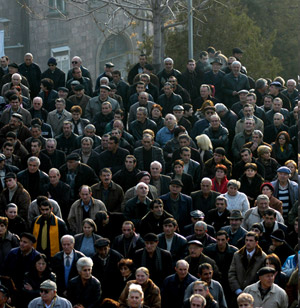The announcement of Robert Kocharyan made during the interview of three TV companies, according to which during the pre-election period the negotiation activeness has reduced in order to avoid inner political games around the Karabagh conflict, was really sensational. The problem is not only the fact that things are this are not spoken out loud but also by this announcement Kocharyan didn’t answer any question but instead created new questions.
Question #1. What does the pre-election period have to do with the conflict? First everybody knows that in any normal country per-election period starts right after the next day of elections. It means there is always pre-election period. Secondly, in February 1998 the Armenian government was changed based on the Karabagh conflict further resolution and the activation around this resolution has started at the second half of 1997. At that, neither 1997 nor 1998 were pre-election years. In other words, if the opposition decided to change the government in our country based on Karabagh conflict resolution it can do any time regardless of pre-election period or other factors.
Question #2. Let’s suppose the co-chairmen of the Minsk Group have offered quite acceptable suggestions to us but the “hostile and aggressive” opposition still adverts to it and brings people out on the street. Now please explain how this is going to happen. Will the government, having unlimited resources, monopolized access to media, not be able to explain to people that the offered solutions are really good? The opposition will definitely not be able to persuade people the opposite with its limited and scarce resources and means. In fact they will be able to do it only if the presented solutions are really bad. In other words, since the government avoids the publication of the current options of resolution means the resolution is really bad. Therefore the opposition might advert to them and win the elections without spending serious resources.
Question #3. RA Foreign Minister Vardan Oskanyan tried to bring reasons why the activeness level of negotiations has lowered by saying that the sides have asked for some time from the co-chairmen to think. Moreover, he said that perhaps the Armenian side has more stuff to think about. At first sight this question may look very weird but in fact this question hasn’t yet been answered concretely by anyone.
The tricky thing is that time to time “information outflow” is undertaken around the negotiation process. And now we approximately know what the Minsk group co-chairmen are offering us. According to those recommendations the Armenian troops must be removed from the five (or seven) liberated areas, the refugees must come back, normal relations must be established between Armenia and Azerbaijan, after which (some time later) referendum will be conducted in Karabakh. The concrete question to this is the following. Which of the mentioned points shall Armenia think of? The thing is that this version is not acceptable by us at all and we keep insisting “first status, then return of territories”. Thus if we asked for some time to think it means we have accepted the principles offered by the co-chairmen.
The Karabakh conflict shall not become an inner political game tool. It was immoral in 1997-1998, it will be immoral now as well. But perhaps it’s necessary to start to actively discuss the issue. It’s pre-election period and the parties must explain to people how there are going to solve the conflict. Otherwise a strange situation will be created. Everybody understands that number one priority issue for Armenia is Karabakh resolution and that everything else, like economy development depends on the resolution. However they ignore and avoid this issue. What elections are we speaking about? Why should people elect if the number one issue is ordered not to talk about?

